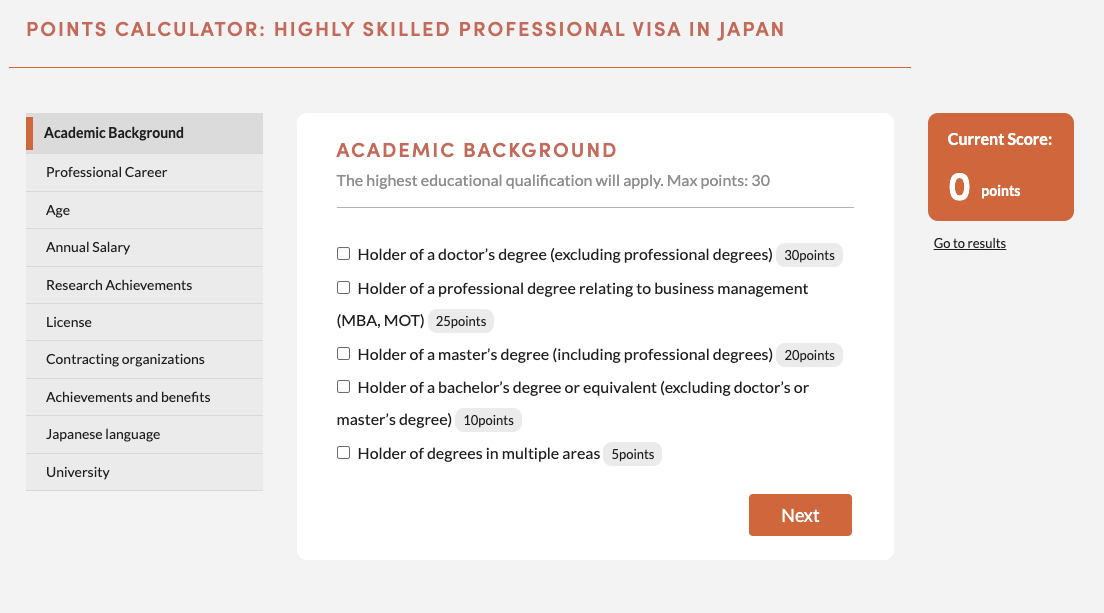Japan HSP Visa for Engineers: What you NEED to know
The HSP visa requirements are confusing.
I have spoken to several people who want to know if they qualify.
This was why we made a calculator to help you understand your eligibility. Check it out here!
To accompany that calculator, I made this blog and infographic!
What is the Highly Skilled Professional (HSP) Visa in Japan?
This visa covers three categories: Advanced Academic Research Activities, Advanced Specialized/Technical Activities, and Advanced Business Management Activities.
For this guide, we will focus on the parts that are relevant to Engineers working in Tech: Advanced Specialized/Technical Activities.
You'll be evaluated on a points system, looking at your academic background, professional experience, salary, and age.
Score high enough, and you'll unlock advantages over standard work visas.
Here is how you qualify:
Eligibility: Who Can Apply for the HSP Visa?
To be eligible for this visa as an engineer, you need 3 things:
A minimum of 3m yen annual salary
A job offer from a company in Japan
A total of 70 or more “points” (the points breakdown is below)
You must meet specific criteria and gather enough points. These categories prioritize your academic achievements, professional prowess, and potential business impact.
Remember, you also need a job offer in Japan and to fulfill standard residence conditions, like having a clean criminal record.
Interested in exploring tech opportunities in Japan? Connect with us for guidance and support.
Points Threshold for an HSP Visa
You'll need at least 70 points in your category to qualify. This scoring considers your academic qualifications, work experience, salary, age, Japanese language skills, and more. Japan regularly updates its immigration policies, so stay informed about the latest criteria.
The Points Criteria: What Counts?
Here's what you need to know about the points system:
Academic Background: Higher education equals more points.
Professional Experience: Relevant work experience counts.
Annual Salary: Higher earnings bring more points.
Achievements and Certifications: Show off your professional accolades.
Age: Younger applicants score higher.
Japanese Language Proficiency: This is crucial and adds significant points.
Each category has its unique points distribution. Aim to exceed the threshold to secure your spot.
This is probably pretty overwhelming, which is why we created a HSP Visa Points Calculator, check it out here:
https://www.wahlandcase.com/tools/hsp-visa-points-calculator
Here’s what you will see when you click the link:
Annual Salary
The annual salary deserves a breakdown.
It works in combination with your age.
The minimum moves up as you get older.
If you are over 35, you need to make more than 6 million JPY to earn any points on salary.
Here is a table that explains:
Disclaimer and Professional Advice:
While our HSP Visa Eligibility Calculator is a powerful tool, it's not a substitute for professional legal advice.
We recommend using this tool as a starting point. For a comprehensive assessment and guidance on your visa application, consulting with a professional immigration lawyer or our experts at Wahl+Case is always a wise step.
Stay informed and prepared with our HSP Visa Eligibility Calculator. If you're keen to explore tech opportunities in Japan and need a professional assessment, reach out to us at Wahl+Case. Let's make your dream of working in Japan a reality!
Now let’s go over benefits you get with this visa.
Benefits of the HSP Visa
Here are the perks that make the HSP Visa so appealing:
Extended Stay: Enjoy stability with a longer visa duration.
Fast-Track to Permanent Residency: Apply for residency sooner than with other visas.
Work Authorization for Spouse: A great plus for your family's wellbeing.
Bring Parents and Domestic Helpers: Under certain conditions, this is allowed.
Engage in Multiple Activities: Flexibility in your professional pursuits.
Quick Immigration Processing: Less administrative hassle.
Support for Education and Childcare: Depending on your location in Japan.
Local Integration Services: Assistance in settling into Japanese life.
Required Documents for the HSP Visa Application
Prepare these key documents for a smooth application process:
Valid Passport
Completed Visa Application Form
Recent Photograph
Certificate of Eligibility (COE)
Detailed Resume or CV
Proof of Skills and Achievements
Proof of Points Calculation
Financial Statements
Health Certificate (if required)
Japanese Language Proficiency Documentation
Family Documents (for accompanying family members)
Additional Documents as requested
Accuracy and completeness are crucial!
Applying for the HSP Visa: A Step-by-Step Guide
Check Your Eligibility and Gather Information
Obtain the COE through a Sponsor in Japan
Prepare Your Visa Application
Submit Your Application at a Japanese Embassy/Consulate
Receive Your Visa and Verify Details
Register at Your Local Municipality in Japan
Pursue Permanent Residency (if applicable)
Stay updated on requirements and consider professional advice for a hassle-free process.
Here are more resources to help you on your way:
FAQ
Visa Duration: How Long Can You Stay?
The initial grant is up to 5 years, with the possibility of renewal. It also offers a faster route to permanent residency. The duration is determined on a case-by-case basis, focusing on your qualifications and job situation.
Looking for a job in Japan? Let's connect at Wahl+Case, and we’ll help pave your way.
Processing Time: How Long Does It Take?
The entire process, from obtaining the COE to receiving your HSP Visa, can take around 1.5 to 4 months. Ensure all documents are accurate and complete to avoid delays. Professional assistance can be beneficial here.


























![Presales Engineer Salary in Japan [NO ADS]](https://images.squarespace-cdn.com/content/v1/5c6e2dad94d71a1ea569fca0/1726807879580-PBSOTUL03B7DQRADXG1U/Presales+Engineer+Salary+blog+%28800+x+600+px%29.png)


